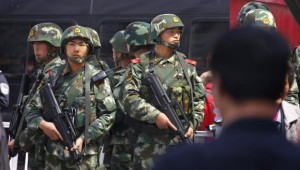Declaring de-radicalisation success, China reduces 11 sentences
Reuters, 3 February 2016
By Ben Blanchard – Authorities in China’s unruly far-western region of Xinjiang have reduced the sentences of 11 people jailed for threatening state security after declaring success of a de-radicalisation program, state news agency Xinhua reported.
Hundreds of people have been killed in violence in Xinjiang in the past few years. The government blames the unrest on Islamist militants who want to establish an independent state called East Turkestan for minority Uighurs, a mostly Muslim people from Xinjiang who speak a Turkic language.
Seven of the convicts had their life sentences reduced to jail terms ranging from 19.5 years to 20 years, including people convicted of instigating “secessionist activities” or participating in terror attacks, Xinhua said late on Tuesday.
The other four had their jail terms cut by six months from initial sentences ranging from 8 to 15 years, it added.
A spokesman for the main Uighur exile group dismissed the report as “political propaganda”.
Xinjiang’s governor, Shohrat Zakir, was quoted by Xinhua as saying that the region’s jails had been very successful in recent years at their de-radicalisation efforts, with a “majority” of convicts becoming law-abiding citizens.
Efforts need to continue in this regard with a focus on those convicted for harming state security, he added.
Xinhua said this had been accomplished by inviting religious leaders and scholars to talk to prisoners about “correct religious belief”.
One of those whose sentence was reduced was identified as Yushanjiang Jilili, the Chinese spelling for Huseyin Celil, a Uighur-Canadian jailed in 2007 for terrorism. China considers him a Chinese citizen.
Chinese Foreign Ministry spokesman Lu Kang said he did not know any details about the sentence reductions, but that all the people involved were Chinese.
The Canadian Embassy in Beijing did not respond to requests for comment.
Reuters was also unable to reach officials in Xinjiang for comment, or any family members of the convicts to verify their stories.
Exiles and many rights groups say the real cause of the unrest is heavy-handed Chinese policies, including curbs on Uighur culture, and a dearth of economic opportunity, rather than any cohesive militant group.
Dilxat Raxit, spokesman for the main exile group the World Uyghur Congress, said news of the commutations was designed as a “political propaganda tool” to cover up the government’s use of the term extremist to repress the Uighur people.
“Be aware that China is using the so-called commutations to mislead the international community and continues to use anti-terrorism to step up its repression,” he said in an emailed statement.
(This version of the story fixes wording in paragraph one to “de-radicalisation”)
(Reporting by Ben Blanchard; Additional reporting by Michael Martina; Editing by Nick Macfie)
http://www.reuters.com/article/us-china-xinjiang-idUSKCN0VC0C4


